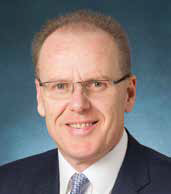
Simon Brookes
DEPUTY GROUP GENERAL COUNSEL, TELSTRA CORP. LTD
GENERAL COUNSEL, TELSTRA INTERNATIONAL
Simon Brookes is Telstra’s deputy group general counsel and the general counsel for Telstra International. Brookes has considerable experience in Asia, having lived and worked in Jakarta, Indonesia; Hanoi, Vietnam and Hong Kong where he has provided legal support for Telstra on material transactions in the region. Together with his family (wife Maria and sons Thomas and Nicholas), Brookes returned to Hong Kong, where he lived from 2000 to 2003, from Sydney in October 2013. “It’s great to be back. Hong Kong is such an engaging and vibrant city, with a really interesting history and bright future coupled with a great culture and people. I try to immerse myself in that,” he says.
The traveling gene
Brookes was born in a small country town in South Australia called Streaky Bay. “It’s known for wheat, sheep and great white sharks — of all creatures,” he says. The local economy is dominated by agriculture; Brookes’ father worked for BP (British Petroleum) where he sold 44-gallon drums of petrol to wheat farmers that drove machinery. As his father’s career progressed with BP they moved around Australia. “I changed schools as my family was relocated, saw different parts of Australia and grew an appetite for travel and change,” Brookes recalls.
A penchant for traveling could also be in his genes. His parents were among the “ten pound Pom” immigrants who came from England in the 1960s as part of a deliberate policy to incentivize migration from Europe to Australia. Beneficiaries of the Assisted Passage Migration Scheme, which launched after WWII, were charged a mere ten pounds for passage to Australia.
Choosing law school
In high school, Brookes always enjoyed legal studies; this was the starting point for wanting to become a lawyer. He says:
“What really intrigued me is the overlap between history and jurisprudence of law coupled with law needing to keep pace with society. With law, you have both a historical perspective and the fact that it continues to evolve and develop. The other attraction was that while laws are an artificial invention of humanity, it is a fundamental building block for an orderly society and economic progress.”
After law school he completed his 12-month articles, which is akin to an apprenticeship, at a large law firm in Melbourne. He chose this firm for a particular reason: It had recently become national rather than state-based at time when most firms had not made this evolution. “I thought this was innovative and farsighted, which it was at the time. Of course now national firms are commonplace and the new wave is international mergers. Certainly, things move on — as they should,” he says.
Initially after completing his articles, Simon did intellectual property work involving trademarks and copyright. This was the early 1990s, and the telecommunications industry in Australia was becoming more competitive, which generated a substantial amount of legal work. “My interest moved from intellectual property to telecommunications. The big break came when I started to do some work on mobile phones, which were in their infancy at that time — 1G!” he recalls.
Choosing in-house
Working on mobile phones piqued his interest, and once Brookes had the opportunity to work for Telstra, which was known as Telecom Australia then, there was no going back. He says:
“I don’t think I could appreciate it at that time — the revolutionary change that mobile devices coupled with the Internet would have on every aspect of our lives. The motivation was a genuine interest in telco products and consumer experience, which resonates with our basic human need to connect and communicate. I also liked the pace of change in the telco industry and the opportunities, risks and challenges that that change brings.”
Joining Telstra allowed him to interact directly with the business, and this necessitated a change in mindset from being a firm lawyer:
“As a junior lawyer in a law firm I had a tendency to see law as the most important element. Not to say one sits in an ivory tower. But one sits in an office with other legal practitioners and specialists. And moving in-house, the perspective quickly changes to being part of a business team and making sure that you help solve problems and add value and communicate in a client-focused manner. What is key to me, and is respected and indeed expected by my employer, is that at all times I give full and frank independent legal advice consistent with my professional responsibilities. This is in everyone’s best interests.”
Since telecommunications is such a rapidly changing, technology-based industry, staying on top of the subject matter can be a challenge. Brookes works on this by seeking to understand the consumer experience, rather than the complex, technical jargon. “I’m not a technology expert. I ask people who know more than me about the technology. I try to understand it in terms that I can relate to or the person in the street can relate to. I don’t need to know exactly how the technology works, just what it means to our customers and how we can help them connect and communicate better,” he says.
Brookes, as part of the Telstra Legal Services Group, works closely with Telstra’s commercial business units as a way to ensure they are aware of new and emerging developments. And Brookes is no stranger to being on the other side of the podium: “A good way to stay on top of things is forcing yourself to present or speak on different matters. You have to learn the subject matter so that you’re confident enough to stand on your feet and speak to others about it.”
Focusing on strategy
Although Brookes started his career doing IP work, it is no longer his main focus. Still, it hasn’t completely disappeared. “One of the areas that I still remain involved with in terms of intellectual property is on topical issues, like what are the rights and obligations of Internet Service Providers (ISPs) with respect to claims by rights holders of online copyright infringement by ISP customers,” he says.
Brookes keeps his focus broad, which is critical in helping to implement Telstra’s strategy. A key part of that strategy is growing the business sustainably in the Asia Pacific region. He spends a considerable amount of time on mergers and acquisitions and helping promote compliance in the business. For example, he has provided legal support for Telstra on material transactions in the Asia Pacific region, including the IPO of Autohome on the NYSE and Telstra’s recent acquisition of Pacnet.
Brookes and his team also look at areas where they can help improve the experience of Telstra’s customers, be they consumers or business customers. For instance, they do considerable work on contract simplification and other ways of easing business transactions. Brookes considers it a success when his team is viewed as a facilitator and influencer, rather than a roadblock or “legal sign off.” He opines:
“The mindset that we bring is that legal helps drive better business outcomes and that it is in the broader interest of the business for us to be involved. That is communicated to the board and CEO through our role as trusted business partners by delivering succinct, business-focused advice — we will be prepared to make the hard calls consistent with company values. We must understand the strategy and the business to be able to provide valuable legal advice and solutions and importantly exercise sound judgment to help cut through complexity and achieve the right business outcome. Not black letter law in a vacuum, but instead to be asking, influencing and advising whether this right thing to do for our shareholders, customers and staff.”
In terms of developing his team and being a successful leader, Brookes emphasizes the importance of having a cohesive unit. “I take great pride in working as part of a champion team, rather than a team of champions,” he says. Additionally he sees diversity as adding a special layer to the team dynamic. It’s certainly a priority for him and the entire Telstra legal leadership team. He says: “It’s something you can never declare victory on. We are a diverse group — two-thirds of our team is female and one-quarter of the team works part-time or in job share arrangements, and we have an active diversity council. We have worked hard to promote and drive flexibility which is an important enabler for success. But we’re looking to do more — so we keep promoting inclusiveness to deliver better business outcomes. It’s a collective goal and achievement.”
He also relishes the challenge of my role that involves thinking globally but acting locally. “This involves developing common values and standards while respecting local differences and cultural diversity. It also demands that I raise my vision and mindset to think of and embrace opportunities in new markets.”
Getting to know… Simon Brookes
WHAT DID YOU LEARN IN LAW SCHOOL THAT YOU STILL USE TODAY?
Many of things from law school still remain with me. Obvious examples would be core knowledge of contracts and torts. Being a commercial lawyer and working for a large company, particularly a large telecommunications company — initially in Australia and now in Asia — an area front of mind is competition law or antitrust. It’s an important building block for most of the work that I do: understanding the principles from both a competitive landscape and also a customer perspective. The success of our company depends on winning the focus and support of our customers. And therefore what I learned is the importance of doing the right thing by customers. That’s something that’s with me to this day, and I’m sure will be for as long as I practice law.
WHAT DO YOU WISH YOU HAD LEARNED IN LAW SCHOOL THAT YOU DIDN’T?
Initially I wish I had spent more time focusing on how to write a good letter of advice, how to write a good contract and how to draft well. The ability to provide good pithy commercial advice is a lawyer’s trade. People rely on you for what you say and how you say it. To be able to say it well and in a manner that resonates with your client is fundamentally important. I think that was something that was brought home to me very early on when I started articles at a law firm in Melbourne. We had to put all of our letters in the partners’ inboxes for sign off, and they would review them by hand. At the start I would get my letters back covered in red ink and that was somewhat of a shock and perhaps at the time a bit of an embarrassment. But it was fantastic training, helping to knock those rough edges off me.
The other thing about my experience at law school is that it was somewhat about studying law as an end to itself. As you move to a commercial world you quickly realize that law is an important cog in a much broader system. What is really important is the ability to provide great client service. People don’t want erudite legal advice for the sake of it. What they want is trusted legal advice that enables them to solve problems in the interest of driving the right business outcomes.
IN MARCH, YOU WERE GIVEN THE ASIA PACIFIC COUNSEL AWARD FOR GENERAL COUNSEL OF THE YEAR. HOW DOES IT FEEL?
I was delighted and frankly surprised to be named AsiaPac General Counsel of the Year. It’s terrific to get acknowledgement from one’s peers and, more broadly, the industry. My wife and sons were also delighted — and I really appreciate their invaluable support — and so were my colleagues and friends. Certainly I’m proud to win, but I don’t get ahead of myself. I’m only as good as the last thing that I’ve done, and besides it’s not about me — it’s about our team, the company, our customers and shareholders. A key barometer of success is the performance of the team and the business. I want to see our company roll out its strategies successfully, especially our growth plans for Asia, and win in the market.
HOW DO YOU BALANCE WORK AND PERSONAL DEMANDS?
I try to be religious about exercise. I make sure that I exercise daily — turning up is a large part of success. I think that’s important. I also make sure that I spend time with my family. On weekends, I do need to work but I put in the time and get the work done, which enables me to be fully off. For me it’s more about flexibility than balancing: choosing the times and places that are important and prioritizing those accordingly. That said I am not perfect and there is room for improvement here.




